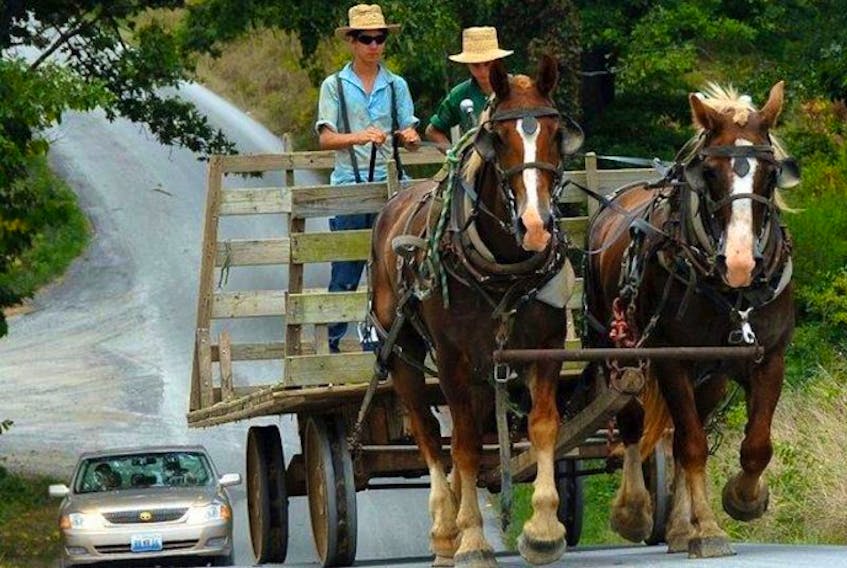Island leaders have done more than bemoan the loss of population. Beginning in the early 1900s, despite a lack of both resources and authority (immigration is a federal jurisdiction), we tried to ride the coattails of national population strategies in order to recruit immigrants.
But we were pretty choosey about the sort of newcomer we desired. Lebanese families were already filtering into the province, but we weren’t interested in recruiting Lebanese people. Chinese immigrants were also trickling in. We had no interest in them either.
What we wanted were well-capitalized English farmers. By 1914 we’d gotten maybe a hundred. Most didn’t stay. In the 1920s we tried again. This time we courted intending emigrants from the Scottish Hebrides, given that nearly half of our population was Scottish in origin. Those people went to Alberta instead.
We even tried to attract settlers from Denmark. In the 1950s a group of Mennonites from the United States explored the possibility of buying land and moving to P.E.I.. Asked its opinion, the Island government advised Ottawa that it didn’t want Mennonite people in Prince Edward Island. They were too different, too “other.” Even land-hungry Dutch farmers, though acceptably Christian and Caucasian, encountered their share of quiet prejudice.
As the recent public symposium demonstrated, population remains very much an issue in this province. Familial trauma aside, it might not matter that so many people are leaving the Island — people move out of Toronto all the time — if more people were coming.
The challenge for this province is to find ways to make this a desirable place to stay. Whether or not we welcome newcomers is one of the few things each of us can control. Yet it is simplistic to expect that Islanders should rush to embrace them. If fear of the unknown daunts the immigrant, that same fear of the unknown — of people who are strange or different — haunts many Islanders, even though our own immigrant ancestors encountered and experienced comparable fears.
Population health is about jobs, to be sure (although, more properly, it is about opportunity), but it is also about finding ways to build, preserve and extend community. That is the true challenge.
When Back-to-the-Landers arrived on Prince Edward Island in the 1960s and ‘70s, they might well have been rejected, given their unconventional lifestyles. Perhaps because they seemed to respect and appreciate our rural culture, they found instead a measure of cautious acceptance (if not approval!) and, in time, inclusion.
The same possibility exists for today’s newcomers, whether Buddhists, Amish, economically motivated Chinese immigrants, or refugees from war-torn homelands. If we can discover in them values that we also think are important, if we feel that they honour our ways, then the building blocks for community — mutual respect and tolerance — are present. If not, today’s newcomers will be sojourners only, not tomorrow’s Islanders.
The next public symposium organized by the Institute of Island Studies on local governance on P.E.I., titled “The Geography of Governance.” Thursday, Feb. 25, at UPEI’s MacKinnon Lecture Theatre, Room 242, Don and Marion MacDougall Hall, 7 p.m. This is being offered free of charge to the public.
Edward MacDonald, is a member of the Department of History; and executive committee, Institute of Island Studies, UPEI
Island leaders have done more than bemoan the loss of population. Beginning in the early 1900s, despite a lack of both resources and authority (immigration is a federal jurisdiction), we tried to ride the coattails of national population strategies in order to recruit immigrants.
But we were pretty choosey about the sort of newcomer we desired. Lebanese families were already filtering into the province, but we weren’t interested in recruiting Lebanese people. Chinese immigrants were also trickling in. We had no interest in them either.
What we wanted were well-capitalized English farmers. By 1914 we’d gotten maybe a hundred. Most didn’t stay. In the 1920s we tried again. This time we courted intending emigrants from the Scottish Hebrides, given that nearly half of our population was Scottish in origin. Those people went to Alberta instead.
We even tried to attract settlers from Denmark. In the 1950s a group of Mennonites from the United States explored the possibility of buying land and moving to P.E.I.. Asked its opinion, the Island government advised Ottawa that it didn’t want Mennonite people in Prince Edward Island. They were too different, too “other.” Even land-hungry Dutch farmers, though acceptably Christian and Caucasian, encountered their share of quiet prejudice.
As the recent public symposium demonstrated, population remains very much an issue in this province. Familial trauma aside, it might not matter that so many people are leaving the Island — people move out of Toronto all the time — if more people were coming.
The challenge for this province is to find ways to make this a desirable place to stay. Whether or not we welcome newcomers is one of the few things each of us can control. Yet it is simplistic to expect that Islanders should rush to embrace them. If fear of the unknown daunts the immigrant, that same fear of the unknown — of people who are strange or different — haunts many Islanders, even though our own immigrant ancestors encountered and experienced comparable fears.
Population health is about jobs, to be sure (although, more properly, it is about opportunity), but it is also about finding ways to build, preserve and extend community. That is the true challenge.
When Back-to-the-Landers arrived on Prince Edward Island in the 1960s and ‘70s, they might well have been rejected, given their unconventional lifestyles. Perhaps because they seemed to respect and appreciate our rural culture, they found instead a measure of cautious acceptance (if not approval!) and, in time, inclusion.
The same possibility exists for today’s newcomers, whether Buddhists, Amish, economically motivated Chinese immigrants, or refugees from war-torn homelands. If we can discover in them values that we also think are important, if we feel that they honour our ways, then the building blocks for community — mutual respect and tolerance — are present. If not, today’s newcomers will be sojourners only, not tomorrow’s Islanders.
The next public symposium organized by the Institute of Island Studies on local governance on P.E.I., titled “The Geography of Governance.” Thursday, Feb. 25, at UPEI’s MacKinnon Lecture Theatre, Room 242, Don and Marion MacDougall Hall, 7 p.m. This is being offered free of charge to the public.
Edward MacDonald, is a member of the Department of History; and executive committee, Institute of Island Studies, UPEI









